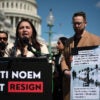In the realm of foreign policy, President Obama’s a second Ronald Reagan, or so says James Joyner, the managing editor of the Atlantic Council.
This is an example of a curious phenomenon: When a conservative is in office, liberals call him mad, bad, and dangerous. But when he’s safely out of office for twenty years or so, he becomes an example of wise and prudent statesmanship, and a supposed inspiration to the liberal idol of the day. It happened to Eisenhower, to Nixon, to Reagan, and to George H. W. Bush. One day, it will even happen to George W. Bush. The only leaders that liberal foreign policy gurus rarely celebrate are their own: No one wants to wear the mantle of Lyndon Johnson or Jimmy Carter.
So it’s no surprise that Joyner’s claiming that President Obama’s a second Reagan. Equally not surprising, the comparison doesn’t hold up. Joyner notes that Reagan supported popular, armed resistance against totalitarian regimes, and that Obama’s backed France and Britain in their incursions into Libya and Mali, and from that builds up an Obama Doctrine as a facsimile of Reagan’s.
But Reagan wasn’t invariably opposed to direct action—witness Grenada, or Lebanon, or the bombing of Libya. On the other hand, Obama’s slow-motion withdrawal from Afghanistan, where thousands of our allies are likely to pay a high price for our withdrawal, is doing exactly what Joyner quotes Reagan as criticizing: “Break[ing] faith with those who are risking their lives.”
The entire equation of foreign intervention with domestic resistance to tyranny is phony: French intervention in Mali may (or may not) be a good thing, but they are not supporting the rebels—France and the U.S. are backing the notably inept and nearly non-existent government.
In Syria, the Obama Administration, and Secretary of State-designate Senator John Kerry (D–MA), saw Bashar al-Assad as a reformer until late in the day—even now, we’re not openly arming the rebels. Even in Libya, the only case where we backed a revolution against a tyrant, we did so through direct intervention, which is exactly what Joyner says Reagan didn’t do. And Libya was hardly a case of “prudent risk management”; it was a case of France deciding to do something, and the U.S. being pulled along behind, which is exactly what is now happening in Mali.
So even on a small scale, the comparison doesn’t work. When you zoom out, it gets worse.
Reagan called the U.S.S.R. the “evil empire” and argued that U.S. leadership was essential to keep it from expanding. The Obama Administration, by contrast, is eager to end the campaign in Afghanistan, argues that al-Qaeda has been “decimated,” and says it is time for the U.S. to focus on nation-building at home.
Reagan’s grand strategy was based in large part on his fundamental belief that a free and capitalist economy could out-build a Communist one, and force them into an arms race that they could not afford. He was correct on both counts—but both counts are conspicuously absent from Obama’s supposed doctrine, which emphasizes instead how the state needs to tax and spend more, and seeks to pay the bills by cutting the defense budget.
Joyner’s final foray is to invoke “the development of the Responsibility to Protect doctrine” (commonly known as R2P) as an answer to the pesky problems of international law that he argues made the Reagan Doctrine so radical. It’s strange that this “responsibility” supposedly made U.S. intervention in Libya both legal and necessary, but hasn’t motivated the U.S. to intervene in Syria. What the ongoing humanitarian catastrophe there has made clear is that R2P isn’t a doctrine, it’s an excuse you pull out of the bag when you’ve decided that you want to intervene. If you don’t want to intervene, you ignore the so-called responsibility.
What Obama has done in Libya and Mali is really quite simple, and it has nothing to do with R2P, or any other doctrine. When France decided that they needed to intervene, either to stop refugee flows or to prop up an ill-governed bit of their former African empire, Obama has gone along. When France hasn’t led—as in Syria—Obama has done little.
Given his enthusiastic support for the European Union (a traditional outlet for French foreign policy) and for the economic model that has failed so badly in France, that is not surprising. But outsourcing American foreign policy to France has nothing in common with the Reagan Doctrine.































